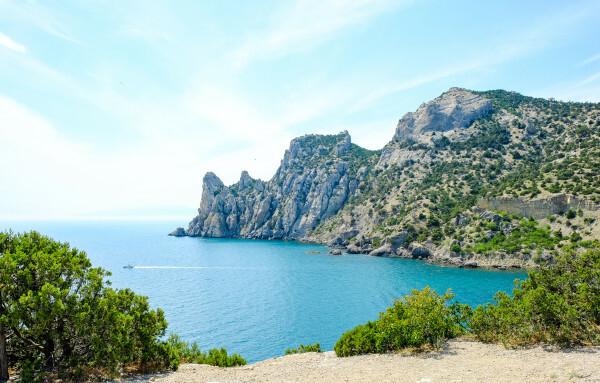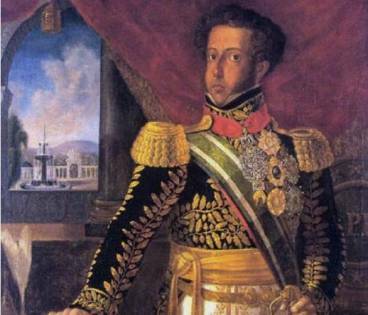Joao Figueiredo was a Brazilian military man and politician who became known as the last president of Brazil in the period of Military dictatorship. His government lasted from 1979 to 1985, being marked by the controlled opening measures promoted by the military and by the strengthening of civil opposition to the military.
He assumed the presidency as Geisel's successor and in the presidency he proved to be an authoritarian figure, being known for his ill-mannered statements. His government achieved poor results in the area of the economy and ended as the last military government after the defeat by Tancredo Neves in the 1985 election.
Read too: Deodoro da Fonseca — the first president of Brazil after the Proclamation of the Republic
Topics of this article
- 1 - Summary about João Figueiredo
- 2 - Birth of João Figueiredo
- 3 - Military career of João Figueiredo
- 4 - Government of João Figueiredo
- 5 - Last years of João Figueiredo
Summary about Joao Figueiredo
João Figueiredo was a Brazilian military man and politician known as president from 1979 to 1985.
He obtained numerous career promotions in the army, rising to the position of head of the National Information Service (SNI) during the government of Ernesto Geisel.
He was nominated by Geisel as his successor, winning the 1978 presidential election.
He proved to be an authoritarian president, making numerous controversial statements.
He refused to participate in the inauguration ceremony of José Sarney in 1985.
Do not stop now... There's more after the publicity ;)
Birth of Joao Figueiredo
Joao Batista de Oliveira Figueiredo was born on January 15, 1918, originating from city of Rio de Janeiro. It was son of a renowned Brazilian military man from the first half of the 20th century, Euclides de Oliveira Figueiredo, a man who had fought against the lieutenants, had been against the Vargas rise to power, in addition to participating in the Constitutionalist Revolution of 1932.
With the fall of Getúlio Vargas, Euclides was also a member of the National Democratic Union, a conservative party. Under the influence of his father, João Figueiredo pursued a military career, as well as two of his brothers. João Figueiredo's mother was called Valentina Silva Oliveira Figueiredo, and six children were born from her marriage to Euclides.
Euclides' involvement with the São Paulo revolt forced his exile between 1932 and 1934. João Figueiredo received his education in military schools, first in a school in Porto Alegre and later in Realengo, in Rio de Janeiro. During the Estado Novo, Figueiredo joined the Army Cavalry.
Military career of João Figueiredo
Upon joining the Cavalry, Figueiredo earned several patent promotions. At the end of the Estado Novo, for example, he already had the rank of captain. In addition, also served in various military institutions. In 1945, Figueiredo joined the Officer Improvement School and became an instructor at the Academia Militar das Agulhas Negras.
Figueiredo also joined the Army Command and General Staff School, the Superior School of War and on the National Security Council, led by Golbery do Couto e Silva, during the Jânio government Pictures. no longer government of João Goulart, assumed the role of instructor at the Army Command and General Staff College.
Joao Figueiredo had a great performance in the coup that overthrew the President Joao Goulart in 1964. With the beginning of the Military Dictatorship, the National Information Service, the SNI, was formed, whose objective was to provide information on internal groups seen as enemies by the military. The SNI was the way the military found to control and neutralize its opponents.
In 1966, Figueiredo assumed command of the São Paulo Public Force, and in Medici government took over the Military Cabinet. no longer government of Ernesto Geisel, Joao Figueiredo was in charge of the SNI and acted directly in the opening process promoted by the military from that government.
The purpose of the military in this process was not to guarantee the return of unrestricted democracy in Brazil, but to guarantee the existence of civil, centralizing and authoritarian governments that would govern the country in accordance with the interests of the military. Figueiredo's position at the head of the SNI made him become Geisel's favorite for presidential succession.
Government João Figueiredo
The choice of presidents during the Military Dictatorship was carried out indirectly, therefore without the participation of the population. With that, the choice of the new president would be made by an electoral college that was composed of the members of the National Congress. The candidate chosen by Ernesto Geisel to succeed him was João Figueiredo, a choice announced in 1977.
On the other side, running against Figueiredo was General Euler Bentes Monteiro, the one indicated by the consented opposition. The result was the Figueiredo's victory; he won 355 votes to General Euler's 226. The election took place in 1978, and Figueiredo took office on March 15, 1979.
On the occasion, João Figueiredo reinforced that he would continue with the process of opening the Dictatorship. João Figueiredo's government ended up being marked by his disastrous economic policy, for the engagement of the population for the end of the Military Dictatorship and by statements rudeof the president.
Journalist Rodrigo Vizeu highlighted some of João Figueiredo's controversial speeches while he was in the presidency of Brazil. Let's see:
For example, in one of his recoveries from heart problems, he stated: 'When I feel like hitting someone, it's a sign that I'm getting better. And I already feel like hitting a lot of people.' [...] In one of his most famous phrases, it was questioned by a journalist about the smell of the people and replied: ‘For me, the smell of the horse.'|1|
In addition to the president's aggressiveness and the authoritarianism of his government, another negative point was the disastrous management that this government made of the economy. Among the indications of this are the fact that this government allowed an inflation of 235.1% in 1985, almost doubled the Brazilian external debt and saw the GDP Brazilian market shrink 4.3% in 1981|2|.
this government was responsible for approving the Amnesty Law, a law that allowed the return of thousands of Brazilians who had fled the country due to the persecution promoted by the military, but also guaranteed the judicial pardon for the repressive agents of the dictatorship, preventing them from being judged for the crimes committed during this repressive period of our history.
Another action of this government that contributed to the progress of the gradual opening was the end of bipartisanship,and with that the country could again have different political parties. The aim was to weaken the opposition formed by the MDB (Brazilian Democratic Movement) because of the emergence of a series of new parties that could “steal” votes from the emedebistas.
The opening promoted by the military, however, was not enough for the population, and this period of history Brazil was marked by popular engagement so that unrestricted democracy would once again become the routine of our country. country. The elections that took place in 1982 demonstrated the dissatisfaction of the population with the Military Dictatorship.
This controlled opening promoted by the government and the engagement of the population for the return of a democracy unrestricted action caused the hard-line military to react and organize a series of bombings across the country. Brazil. The most symbolic case was the Riocentro Attack, in 1982, in Rio de Janeiro.
With the strengthening of the opposition, a Constitutional Amendment was proposed in 1983 by federal deputy Dante de Oliveira. This amendment proposed the return of direct presidential elections in Brazil and started the campaign of the Direct now, with huge popular engagement and resulting in gigantic rallies, like the one that mobilized 400,000 people in São Paulo, for example.
At the end, the direct ones are no longerram approveds in the National Congress and the 1985 presidential election was held indirectly. With the defeat suffered by the opposition in the vote on the Dante de Oliveira Amendment, the solution was to organize the candidate who would have the greatest chance of defeating the military in the presidential election.
The chosen name was Tancredo Neves, an opposition politician from Minas Gerais who had a more favorable opinion among the Brazilian military. The military, gathered in the Social Democratic Party (PDS), decided on Paulo Maluf from São Paulo, but this was an unpopular choice that contributed to split the party.
Despite the fact that the population did not vote, popular support for Tancredo's candidacy was intense, and this was reflected in the result of the election: Tancredo Neves obtained 480 votes against 180 votes for Paulo Maluf. With the defeat of Paulo Maluf, the government of João Figueiredo and the Military dictatorship they were closedones in 1985.
João Figueiredo refused to attend the inauguration ceremony of José Sarney, who assumed the presidency on an interim basis due to the hospitalization of Tancredo Neves, but ended up remaining in the position after the death of the president-elect.
See too: Fernando Collor de Melo — the first president elected by the population after the Dmilitary iteration
Last years of João Figueiredo
Joao Figueiredo chose to withdraw completely from public life, isolating himself in a place in the interior of Rio de Janeiro. Despite this, he reappeared on a few occasions to threaten democracy and make statements of a coup-like nature. In 1993, João Figueiredo's candidacy for the presidency was considered for the following year's election, but he did not support this idea.
From 1995, João Figueiredo had serious health problems, even being admitted to the ICU for several days and losing almost all of his vision. The heart and spine problems worsened, and Figueiredo felt so much pain in his spine that he even had surgery with a medium. Joao Figueiredo, however, died on December 24, 1999.
Grades
|1| VIZEU, Rodrigo. Presidents: the story of those who ruled and ruled in Brazil, from Deodoro to Bolsonaro. Rio de Janeiro: HarperCollins, 2019, p. 212.
|2| Same, p. 213.
By Daniel Neves Silva
History teacher
Access the website and learn more about the Diretas Já movement. Learn more about its leaders, how the rallies took place and the outcome of this movement.
Click and access this text to learn a little more about the Military Dictatorship, a dictatorial period in our republican history that lasted for 21 years.
Click and see details about José Sarney's government. Understand how a supporter of the dictatorship became the first civilian president after the end of that regime.
The achievements and frustrations of José Sarney's government inaugurated the New Republic.
Learn more about the Riocentro case and the military's attempt to prevent Brazil's political opening during the military dictatorship.
Access and learn more about the life of an important character in Brazilian history. Get to know the main details of Tancredo Neves' political life.



